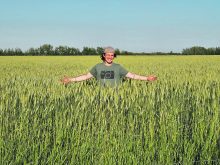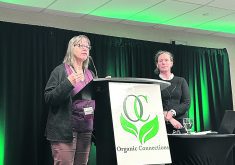Clarifications surrounding how gene-editing seeds and crops will be regulated have drawn widespread approval from the grains and oilseeds sector, except for those in organic production.
Agriculture minister Marie-Claude Bibeau last week announced the updated guidance for Part V of the Seeds Regulations. Last year, Health Canada announced its guidance for food containing plants with novel traits and the same for feed is expected later this year.
The environmental pre-market assessment guidance treats gene edited crops essentially the same as plants bred conventionally.
“It is the scientific opinion of the CFIA that gene editing technologies do not present any unique or specifically identifiable environmental or human health safety concerns as compared to other technologies of plant development,” the guidance document said.
Read Also

GMO market access issues remain concern for growers
One would think that three decades of no ill health effects from eating food made with GM crops would be considered long enough, but that’s the world in which we live.
Bibeau said Canada has a role to play in feeding a growing world in uncertain weather conditions and must be open to innovation that increases production while protecting the environment.
“We have long relied on various breeding methods to obtain plants that are more productive, more nutritious and more pest resistant,” she said during the announcement. “Gene editing is ushering in a new era for conventional plant breeding techniques.”
The guidance clarifies the definition of a novel trait in a seed and supports the development and adoption of the technique.
Bibeau said the government never intended to take a different approach. But the organic sector last fall had concerns about how they would distinguish between conventional and gene-edited seeds.
A technical committee spent the last six months examining how to maintain the integrity of organic certification.
Bibeau said three actions will be taken to ensure this. Seeds Canada will strengthen its database to clearly identify production methods and a government-industry steering committee that includes organic representation will establish clear procedures and control measures for the database.
The third prong is for the government to act on the recommendations of the steering committee to establish monitoring procedures that ensure the database is accurate and reliable.
“I am confident that these measures will allow the organic sector to have access to reliable information to make informed decision about their seeds,” said Bibeau.
She also announced the federal government will financially support the review of Canada’s organic standards scheduled for 2025.
But Allison Squires, president of Canadian Organic Growers and an organic farmer in Saskatchewan, said she is worried about the future of her farm and others.
“There’s the potential we could contaminate our seed supply with undeclared or undisclosed GE (genetically engineered) seed,” she said. “The changed guidance means that there’s going to be no mandatory declaration for government if a company wants to produce and see GE seed in Canada. It’s all voluntary.”
Squires said organic farmers do their best to make sure their seed isn’t treated with any prohibited substance and is ideally produced organically. However, seed supplies are short and that’s not always possible. The concern is that organic farmers could inadvertently buy and plant gene-edited seed.
“That land that we planted that seed on is no longer certified organic,” she said. “We could lose half of our farm or more depending on the varieties of seed.”
Squires said the sector wanted a mandatory list that is government regulated. Monitoring and oversight is good in theory, she added, but a privately owned, industry-funded regulated database puts organic farmers in a tricky spot.
And she questioned how much clout the steering committee would have.
“We’ve been told by Seeds Canada that there’s no legal requirement that they need to follow all the recommendations from the steering committee,” she said.
Seeds Canada declined a request for more information until this week, after Western Producer deadlines.
The Canada Grains Council said the guidance will help Canada stay competitive globally.
“Many of our trading partners have already adopted similar science-based policies, and farmers outside of Canada have been growing gene edited crops since 2015,” said Krista Thomas, vice-president of seed innovation.
Dave Carey, vice-president of government and industry relations at the Canadian Canola Growers Association, said the organization was happy to see the industry move one step closer to transparent and predictable guidelines.
He said once feed, which is the third leg of the plants with novel traits stool, is complete, Canada will have caught up to other countries.
“What’s really exciting about gene editing from a canola farmer’s perspective is that gene editing is a much less expensive technology than traditional biotechnology or than GMOs,” he said.
“I’m really excited to see small and medium-sized companies that are Canadian startups investing in this space.”
He said Canada will compete for global investment dollars and perhaps some of these smaller companies can bring regional canola varieties to market, such as winter canola for Ontario or crush-specific canola in Western Canada.
CropLife Canada vice-president of plant biotechnology Ian Affleck said the database will provide a platform for information on any variety of GE crop.
“The key to this database is to deliver to the value chain what they need. This is why that roundtable is going to be so important,” he said.
Affleck said the entire industry has to work together and communicate to ensure everyone understands how marketplace transparency works.
“CropLife Canada and Seeds Canada and its members are part of the organic value chain,” he said. “We supply the organic sector with the seed they need and the crop protection products they need and the biologicals they need so we are partners in the growth of their sector and we will continue to deliver them what they need.”


















